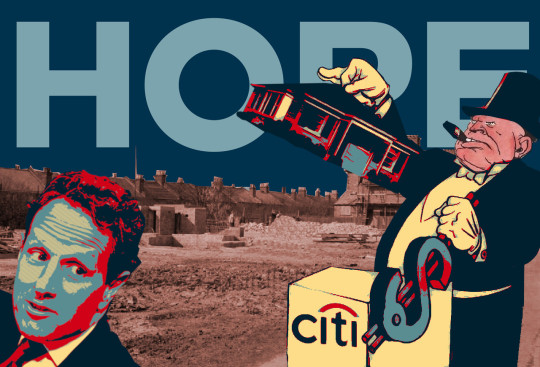#corporate financing
Text

#campaign finance reform#oligarch dark money#Republican Nazi oligarchs#republican billionaires purchased the SCOTUS#illegitimate scotus#republican assholes#never trump#maga morons#traitor trump#crooked donald#republican hypocrisy#corporate greed#republican party#leonard leo#Harlan crow
547 notes
·
View notes
Text

oh my god its jack marston
#rdr#rdr2#red dead redemption 2#red dead redemption#jack marston#IGNORE THE BOOK TITLE LMAO#jack marston reading about corporate finance is more real than you think /j
296 notes
·
View notes
Text
streaming services try not to cancel and fuck animation over challenge (SUPER HARD)
881 notes
·
View notes
Video
youtube
How the Corporate Takeover of American Politics Began
The corporate takeover of American politics started with a man and a memo you've probably never heard of.
In 1971, the U.S. Chamber of Commerce asked Lewis Powell, a corporate attorney who would go on to become a Supreme Court justice, to draft a memo on the state of the country.
Powell’s memo argued that the American economic system was “under broad attack” from consumer, labor, and environmental groups.
In reality, these groups were doing nothing more than enforcing the implicit social contract that had emerged at the end of the Second World War. They wanted to ensure corporations were responsive to all their stakeholders — workers, consumers, and the environment — not just their shareholders.
But Powell and the Chamber saw it differently. In his memo, Powell urged businesses to mobilize for political combat, and stressed that the critical ingredients for success were joint organizing and funding.
The Chamber distributed the memo to leading CEOs, large businesses, and trade associations — hoping to persuade them that Big Business could dominate American politics in ways not seen since the Gilded Age.
It worked.
The Chamber’s call for a business crusade birthed a new corporate-political industry practically overnight. Tens of thousands of corporate lobbyists and political operatives descended on Washington and state capitals across the country.
I should know — I saw it happen with my own eyes.
In 1976, I worked at the Federal Trade Commission. Jimmy Carter had appointed consumer advocates to battle big corporations that for years had been deluding or injuring consumers.
Yet almost everything we initiated at the FTC was met by unexpectedly fierce political resistance from Congress. At one point, when we began examining advertising directed at children, Congress stopped funding the agency altogether, shutting it down for weeks.
I was dumbfounded. What had happened?
In three words, The Powell Memo.
Lobbyists and their allies in Congress, and eventually the Reagan administration, worked to defang agencies like the FTC — and to staff them with officials who would overlook corporate misbehavior.
Their influence led the FTC to stop seriously enforcing antitrust laws — among other things — allowing massive corporations to merge and concentrate their power even further.
Washington was transformed from a sleepy government town into a glittering center of corporate America — replete with elegant office buildings, fancy restaurants, and five-star hotels.
Meanwhile, Justice Lewis Powell used the Court to chip away at restrictions on corporate power in politics. His opinions in the 1970s and 80s laid the foundation for corporations to claim free speech rights in the form of financial contributions to political campaigns.
Put another way — without Lewis Powell, there would probably be no Citizens United — the case that threw out limits on corporate campaign spending as a violation of the “free speech” of corporations.
These actions have transformed our political system. Corporate money supports platoons of lawyers, often outgunning any state or federal attorneys who dare to stand in their way. Lobbying has become a $3.7 billion dollar industry.
Corporations regularly outspend labor unions and public interest groups during election years. And too many politicians in Washington represent the interests of corporations — not their constituents. As a result, corporate taxes have been cut, loopholes widened, and regulations gutted.
Corporate consolidation has also given companies unprecedented market power, allowing them to raise prices on everything from baby formula to gasoline. Their profits have jumped into the stratosphere — the highest in 70 years.
But despite the success of the Powell Memo, Big Business has not yet won. The people are beginning to fight back.
First, antitrust is making a comeback. Both at the Federal Trade Commission and the Justice Department we’re seeing a new willingness to take on corporate power.
Second, working people are standing up. Across the country workers are unionizing at a faster rate than we’ve seen in decades — including at some of the biggest corporations in the world — and they’re winning.
Third, campaign finance reform is within reach. Millions of Americans are intent on limiting corporate money in politics – and politicians are starting to listen.
All of these tell me that now is our best opportunity in decades to take on corporate power — at the ballot box, in the workplace, and in Washington.
Let’s get it done.
#youtube#videos#video#powell memo#corporations#wall street#finance#corruption#politics#lobbying#government
1K notes
·
View notes
Video
Corporate takeover of the US
https://en.wikipedia.org/wiki/Lewis_F._Powell_Jr.
#tiktok#Lewis f powell#powell memo#citizen's united#us supreme court#capitalism is a scam#labor movements#labor movement#advertising#reagan was a terrible president#ronald reagan#reagan#FTC#anti-trust laws#corporate greed#corporate welfare#us political lobbying#us political financing#robert reich#us elections#workers rights#workers vs capital#union workers#price gouging#taxes#history#american history
299 notes
·
View notes
Text
genuinely bewildered at how it's just g@merg@te again. like it's just exactly the same strategy, except now it's a cabal of dark and sinister narrative designers instead of "there are women near my games" but it's like the same fucking thing and I'm so tired honestly
#thoughts#as a dark and sinister narrative designer I wish I was part of the secret club that apparently finance every game with a diverse cast#when I tried to fund my very queer game with a black lead I got told by a room full of 50 white men that “nobody wanted this”#in spite of our market analysis screaming otherwise#and then was ridiculed in front of my men colleagues and told I couldn't be trusted because I would spontaneously give birth#and forget all my dreams instantly#or I was considered the “fun girl” who was only there to present the game (it was MY game!!!)#and for every serious conversation they went to my male colleague behind my back#so yeah I want in on that sweet diversity money pleaaaase#without having to debase myself to get it#this is so fucking stupid#(and like there are things to be said about the handling of DEI in corporate settings)#(I had almost nothing but bad interactions with such structures personally)#(but it was because it was a tool turned *against* minorities to speak over them and police their self-expression most of the time)#(for the sake of corporate interests or to protect the feelings of whoever was in position of power)#(so I think there are conversations to be had and it's actually a pretty complicated subject that can get VERY VERY messy)#(but yeah this aint it gamers)
24 notes
·
View notes
Text
Based off of how literally every artist I know is now in accounting or teaching. Day job here means where you get the bulk of your income or benefits. And this goes for any artistic major! Fine arts, animation, theater, film etc
#ramblings#polls#like art is a side gig and a hobby for me but I fear I’m gonna be in corporate finance for life lol (actually stoked abt that)
14 notes
·
View notes
Text
lord I am so exhausted of applying to dozens of jobs every week without getting a single response other than your application wasn’t selected. my current job is wrecking me and I am so burnt out and just want a job that pays well and doesn’t make me want to die 24/7. im at my wits end like who do I need to pay to make my resume/linkedin stand out because how do people hear back from jobs??? what am I doing wrong
#all I can do is cry#im so exhausted#corporate work is so hard and soul sucking#except for the people who have good corporate jobs how do they get those and why have I submit over a thousand apps within the last year#and heard back from maybe 3#im so tired#if only I had gotten a degree in fucking computer science lol#the only industry that pays well and doesn’t require you to sell your soul and life#i’ve been trying to teach myself sql and python but im failing miserably#if I had just done coding in college and not stupid fucking finance :)
20 notes
·
View notes
Text
Prissy and Studious








#studyblr#pink academia#black girl aesthetic#black studyblr#preppy black girl#corporate barbie#preppy black girl aesthetic#finance student#vision board
722 notes
·
View notes
Text
#Republican Endorsed Killings
#Well Regulated Militia
#Republican endorsed killings#well regulated militia#2nd amendment assholes#the nra is a terrorist organization#gun control#gun violence#gun crime#gun slaughter#mass shooting#Memphis mass shooting#nra owns republicans#Russia finances nra#republican assholes#maga morons#never trump#corporate greed
18 notes
·
View notes
Text




One day, I’ll reach my dream of working in the city.
#corporate girl#finance#finance girl#lawyer#aesthetic#university#studyblr#study blog#studyinspo#banking#banker#investment banking#london#I wish to be smart#girlblogging#academia aesthetic
38 notes
·
View notes
Text




Some Branch Accountant concepts; (he and Benjamin used to date ages ago, back in their old conglomerate)
#he's the priest that was spoken of in one of my Benjamin arts#Lucretius would probably have mixed feelings seeing Benjamin again#he was outcasted by their old conglomerate's church because of their relationship and he hasn't been doing great since#it's been more than 15 years since they've seen each other#Lucretius would be nervous; what if Benjamin hates him? He hasn't been doing great himself what if Benjamin hasn't been either?#What if Benjamin is doing good? How would he look to him? etc#Lucretius tends to overthink things and is avoidant of conflict so he'd most likely shy away from speaking to Benjamin#Besides;; he doesn't work for COGS.INC; he's just visiting for a meeting discussing the possibility of being transferred over in the future#and about keeping track of finances between conglomerate branches when COGS.INC goes forth with expanding outside etc etc#Benjamin would be in disbelief seeing Lucretius... he hasn't talked to or seen him in forever.. poor bloke seems different#ttcc#toontown corporate clash#toontown: corporate clash#imagionary rambles#ttcc au#Lucretius Cardinal#Branch Accountant#ttcc oc
20 notes
·
View notes
Text
Biden set to appoint mass foreclosure cheerleader to the Fed

Personnel are policy, something that the Biden administration has proved again and again since the 2020 election. Biden himself is a kind of empty vessel into which different wings of the Democratic party pour their will, yielding a strange brew of appointments both great and terrible.
If you’d like an essay-formatted version of this post to read or share, here’s a link to it on pluralistic.net, my surveillance-free, ad-free, tracker-free blog:
https://pluralistic.net/2023/03/06/personnel-are-policy/#janice-eberly
On the one hand, you have progressive appointments like Jonathan Kanter at the DoJ and Lina Khan at the FTC, leaders who are determined to challenge and curb corporate power:
https://pluralistic.net/2022/01/10/see-you-in-the-funny-papers/#bidens-legacy
On the other hand, you have deferential leaders like Pete Buttigieg, who fill their own staff with status quo counsel, and then let those timid corporate apologists run the show, leaving the substantial enforcement powers of a powerful agency to gather dust:
https://pluralistic.net/2023/01/10/the-courage-to-govern/#whos-in-charge
While the Democrats’ anti-corporate wing got to drive the administration’s competition agencies, the corporate wing has enjoyed near-total dominance over finance regulations (with notable exceptions, e.g. Rohit Chopra), starting with Trump’s Jerome Powell, a bloodletting monster happy to shovel workers into their bosses’ crushers all day long:
https://pluralistic.net/2023/01/19/creditors-vs-workers/#finance-colored-glasses
Corporate Dems continue to flex their muscle. A seat has just opened up on the Federal Reserve Board, and the WSJ is pretty sure the seat is going to Janice Eberly, a corporate ghoul who helped Obama Treasury Secretary Timothy Geithner steal Americans’ houses on behalf of the bankers who destroyed the world economy in 2008:
https://www.wsj.com/articles/white-house-considers-two-economists-for-fed-vice-chair-58f13344
A quick refresher: Obama inherited the Great Financial Crisis, a massive global asset crash that followed from a decade of real-estate and derivatives deregulation that saw the world’s largest banks issuing mortgages they knew would fail, and then placing massive bets on “collateralized debt obligations” that were supposed to offset the risk.
The banks gambled trillions, nearly destroyed the world’s economy, and then blamed it all on reckless borrowers — mortgage holders who had been mis-sold predatory mortgages that were designed to trigger defaults thanks to low “teaser rates” that later “ballooned” into monthly payments the banks knew the borrowers couldn’t afford.
Geithner was Obama’s go-to guy for the GFC. It was under his leadership that billions were handed out to the banks to bail them out and keep them solvent during the crisis — and it was also under his leadership that bank execs were able to pay themselves millions in bonuses using that public money.
When the banks were in trouble, Geithner leapt into action. When the banks’ customers faced crises, he was MIA — especially during the foreclosure epidemic that followed, as the banks stole our homes out from under us, often forging the paperwork. No bank was seriously punished for this policy.
Back to Janice Eberly, who served as Geithner’s assistant secretary of the Treasury for economic policy — his hatchet-woman, in other words. Now, sometimes people in senior government roles stick around because they disagree with their bosses and want to mitigate the harm of their bosses’ policies.
That’s not why Eberly took the job. In 2014, she and Arvind Krishnamurthy co-wrote a Brookings Institute paper called “Efficient Credit Policies in a Housing Debt Crisis,” that explained why Geithner had it right all along — bailing out the banks and leaving homeowners in foreclosure is “efficient”:
https://www.brookings.edu/wp-content/uploads/2016/07/fall2014bpea_eberly_krishnamurthy.pdf
Writing in The American Prospect, Max Moran from the Revolving Door Project breaks down “Efficient Credit Policies,” explaining how Eberly’s stated views should disqualify her from sitting on the Fed board, especially as we teeter on the brink of a deep financial crisis:
https://prospect.org/economy/2023-03-06-janice-eberly-fed-nominee-mortgage-crisis/
The first thing you need to understand here is HAMP, the Home Affordable Modification Program, which received the $100b Congress allocated to help homeowners whose mortgages were “underwater” — that is, whose houses were worth less than they owed for them.
That money could have gone to “principal reduction” — that is, to paying off part of your loan. If you owned $350,000 on a house that was now worth $300,000, the Feds could give the bank $50k and you wouldn’t be underwater anymore. The FDIC proposed just this, in a plan that would have required homeowners to pay back the US government if the price of their homes rebounded.
If you want to keep Americans from losing their homes, principal reduction is a straightforward and reliable approach. But the banks hated this — and that meant Geithner wouldn’t do it. Banks don’t like principal reduction because it means that they’ll lose out on future payments: reducing your principal by $50k now means that the banks won’t get hundreds of thousands of dollars over the 30 years of your mortgage.
Using the money for principal reduction would have meant the banks’ balance sheets would have looked a little worse — which, as Moran points out, is a perfectly fair outcome for banks that had just come close to destroying the world economy, especially since many of these underwater borrowers were destined to lose their houses and would never make those payments.
But Geithner didn’t do principal reduction. Instead, he did HAMP, which was just a way to temporarily lower borrowers’ monthly payments so they could stay in their homes. Geithner sold Obama on this plan, convincing him to renege on his election promise to support a “cramdown” on the banks, which would have saved homeowners:
https://www.propublica.org/article/dems-obama-broke-pledge-to-force-banks-to-help-homeowners
HAMP was full of the kinds of complex requirements and paperwork that the professional managerial class love, rules that made it almost impossible for homeowners to invoke HAMP and improve their payments. Meanwhile, the banks got “investor incentive payments” that let them take in public money even as they foreclosed on the public:
https://www.irs.gov/newsroom/principal-reduction-alternative-under-the-home-affordable-modification-program
HAMP was a disaster. Almost no one managed to use it, and even among the lucky few who did manage to do so, many were tricked into foreclosure.
https://www.theguardian.com/money/2014/mar/30/government-program-save-homes-mortgages-failure-banks
This is the policy that Eberly and Krishnamurthy defend in their paper: rather than reducing debt, just temporarily restructure mortgage payments. One reason they defend this: it’s cheaper, and Congress didn’t allocate enough money to help everyone who needed principal reduction. But, as Moran points out, Geithner’s anemic response to the crisis caused Congress to claw back $225b of the money allocated to deal with it — enough to do $50k principal reductions for 4.5m households. Under Geithner, HAMP only spent $10b.
But of course, the US government didn’t need to pay the banks off to do principal reduction. They could simply order the banks to take a loss. That’s how lending usually works: lenders who originate bad loans have to eat them — they don’t get made whole by Uncle Sucker.
But when Eberly was working for Geithner, “federal officials convinced themselves this was impossible.” Rather than hold banks to account for their reckless speculation, Geithner announced that he was going to “foam the runway” for the banks, pureeing Americans’ homes to make the foam.
But Eberly’s tenure coincided with the banks’ rebound — by the time she went to work for Geithner, they were rolling in dough, posting massive profits. As @[email protected] put it, “If you force them to eat a bunch of foreclosure losses, maybe a few hundred billion over several years, it probably wouldn’t have been that bad.”
https://www.youtube.com/watch?v=pPLbnr1mxBs
Moran nails it here: “When a bad loan is made, it is both prudent and fair for the lender to bear the most responsibility. They are supposed to be wise stewards of their own capital. Instead, ordinary homeowners who did the least of any actor to cause the financial crisis ended up eating the losses.”
Eberly and Krishnamurthy claimed that Geithner’s policy would be efficient, and that it wouldn’t lead to mass foreclosures. As neoclassical economists love to do, they “proved” this using elaborate mathematical models. And, also in the grand neoclassical tradition, they didn’t bother to check whether their model was correct.
To quote Ely Devons: “If economists wished to study the horse, they wouldn’t go and look at horses. They’d sit in their studies and say to themselves, ‘What would I do if I were a horse?’”
https://pluralistic.net/2022/10/27/economism/#what-would-i-do-if-i-were-a-horse
Here’s what Eberly and Krishnamurthy missed: the choice to foreclose wasn’t being made by the lenders, they were being made by the mortgage servicer, a kind of consequence-free middleman who made more money by foreclosing on homeowners, even if the lenders lost more money over the long term:
https://www.researchgate.net/publication/228125783_Why_Servicers_Foreclose_When_They_Should_Modify_and_Other_Puzzles_of_Servicer_Behavior_Servicer_Compensation_and_its_Consequences
Eberly and Krishnamurthy barely mention the existence of servicers, but another researcher was keenly aware of them: a law prof named Katie Porter, who delved into the servicers’ role in foreclosure in a report for the California AG:
https://oag.ca.gov/sites/all/files/agweb/pdfs/mortgage_settlement/01-report-waiting-for-change.pdf
Porter identified the servicers’ “dual track” approach to distressed mortgage borrowers: on the one hand, they slow-walked HARP-based changes to payments, and on the other hand, they raced to foreclose on those borrowers who were waiting for their payments to reset.
The servicers’ hunger to throw people out of their homes knew no bounds: they set up massive robo-signing boiler-rooms where low-waged employees forged deeds to plug the paperwork holes created by the high-speed, unregulated speculation on mortgages that precipitated the Great Financial Crisis:
https://www.reuters.com/article/robosigning-plea/ex-mortgage-document-exec-pleads-guilty-in-robo-signing-case-idUSL1E8ML0C120121121
Eberly knew about robo-signing, she knew about servicers, she knew about foreclosures. It was her job to know. But she still wrote her paper defending Geithner’s runway-foaming and all those ruined lives:
Principal reduction can be helpful, but it is a less efficient use of government resources, since it back-loads payments to households that cannot borrow against these future resources to support consumption today, and also because it is most helpful in reducing strategic default, rather than payment-distress-induced default,
This is just means-testing by another name, a fetish for separating the “deserving poor” from “moochers” (AKA “strategic defaulters”). The PMC loves means-testing, but only for poor people. As Moran points out, rich people like Trump use strategic defaults all the time:
https://www.nytimes.com/2016/06/12/nyregion/donald-trump-atlantic-city.html
Elite economists and finance ghouls convinced themselves that helping people stay in their homes would enable waves of crooked “strategic defaulting” but there’s no evidence this was ever widespread — rather, it was a fairy tale that justified mass foreclosure:
https://www.nber.org/system/files/working_papers/w27585/w27585.pdf
Eberly helped throw millions of Americans into the street in order to reward reckless banks, already wildly profitable banks, with even more profit. And far from regretting this, she went on to write elaborate justifications for the cruel policies she helped administer.
The historian Michael Hudson describes debt and debt cancellation as a key determinant of whether a given civilization survives. In every venture, producers have to borrow capital from lenders — farmers, for example, must borrow to pay for seed and fertilizer and labor. When the ventures are successful, the borrowers pay back the lenders.
But not every venture can succeed. There will always be blights, droughts, fires and other risks that can’t be fully mitigated. When failure occurs, borrowers can’t pay back creditors. If you farm long enough, you’ll eventually lose a crop, and have to roll over your debts next year. Eventually, you’ll owe so much that you can’t even make the interest payments.
In the absence of some structured, periodic debt cancellation — such as the Bronze Age tradition of Jubilee — creditors eventually end up controlling the work of the entire productive sector. When that happens, your society stops producing what everyone needs, and instead just makes the things that rich people want:
https://pluralistic.net/2022/07/08/jubilant/#construire-des-passerelles
A civilization can’t survive if all of its farmers are growing ornamental flowers for rich creditors’ villas instead of staple crops. It can’t survive if every productive worker is stuck in a dead-end job or a dead-end place because of medical or student debt.
Personnel are policy. Eberly has explained, in excruciating detail, exactly what policy she favors — policy that rewards reckless speculation by incinerating the life chances of everyday Americans. Appointing her to the Federal Reserve board would be a giant Fuck You from the Biden admin to every person who got their home stolen by a bank.
Tomorrow (Mar 7), I’m doing a remote talk for TU Wien.
On Mar 9, you can catch me in person in Austin at the UT School of Design and Creative Technologies, and remotely at U Manitoba’s Ethics of Emerging Tech Lecture.
On Mar 10, Rebecca Giblin and I kick off the SXSW reading series.
Image:
Medill DC (modified)
https://commons.wikimedia.org/wiki/File:Timothy_Geithner_in_2011.jpg
CC BY 2.0
https://creativecommons.org/licenses/by/2.0/deed.en
[Image ID: A bombed out neighborhood. Over the crumbling houses is the 'HOPE' wordmark from Shepard Fairey's Obama campaign posters. On the right is the grinning face of Obama Treasury Secretary Timothy Geithner, colorized to match the Fairey posters. On the left is an ogrish, top-hatted capitalist figure, chomping a cigar and disdainfully holding aloft a single-family home between a gloved forefinger and thumb. He stands before a podium bearing the Citibank logo. The podium has a lever in the shape of a golden dollar-sign, which he is yanking with his free hand. He, too, has been colorized in the mode of the Fairey poster.]
#pluralistic#timothy geithner#personnel are policy#evictions#great financial crisis#gfc#foreclosure#foreclosure epidemic#finance#corruption#revolving door project#biden administration#corporate democrats#democrats#janice eberly#federal reserve#the fed#brookings institution#distressed assets#tarp#impunity#no banker left behind#hamp#Arvind Krishnamurthy#economic#Home Affordable Modification Program#moral hazard#incentives matter#mortgage servicers#katie porter
46 notes
·
View notes
Note
Nothing makes me feel better emotionally than seeing other adults that I admire also have to deal with their work clients being absolutely stupid or irrating. Like I know that's a weird statement but I'm glad it's not just me that feels like this.
This is about your rant about your client btw
LOL I usually try to keep a pretty decent separation between here and real life/career just so I can have a nice online space to exist in, but sometimes. Sometimes I just. Let me be clear, our clients routinely break little pieces of my remaining soul on the daily lmao but I tend to keep that bitching for my close friends. Sometimes that bitching breaks containment. Solidarity, friend. Make sure you have good non-work things to help regrow and feed your happiness outside of your job.
#ask me stuff!#the frustrations i could tell you#the idiocy i could expose in leadership positions of one of the biggest american apparel companies#i mean i dont really have to bc their published quarterly finances and their public debt record#but yeah#im one degree removed from corporate and thats close enough#closer than i ever want ever again LMAO
14 notes
·
View notes
Text
Corporate Finance Brilliance: The Ultimate Student Guide to Assignment Assistance

Embarking on the journey of corporate finance education can be both exhilarating and challenging for students. As the intricacies of financial concepts unfold, students often find themselves grappling with complex assignments, homework, and exams that demand a profound understanding of corporate finance principles. To navigate this challenging terrain successfully, it's essential to seek the right guidance and assistance. In this comprehensive guide, we explore the significance of corporate finance assignment help and provide invaluable insights for students striving for brilliance in their financial education.
Understanding the Essence of Corporate Finance Assignment Help
Corporate finance is a specialized field that requires a deep understanding of financial strategies, risk management, capital allocation, and valuation. As students delve into this intricate subject, they encounter assignments that demand critical thinking, analytical skills, and a solid grasp of theoretical frameworks.
Seeking corporate finance assignment help is not a sign of weakness; rather, it's a strategic move towards academic excellence. These services offer tailored support, providing students with the tools and knowledge needed to excel in their assignments and grasp complex financial concepts effectively.
Unraveling the Benefits of Assignment Assistance
Concept Clarity: Corporate finance assignment help services are designed to clarify intricate concepts for students. Whether it's understanding capital budgeting, analyzing financial statements, or evaluating investment decisions, expert assistance ensures that students gain a comprehensive understanding of the subject matter.
Timely Submission: Assignments often come with tight deadlines, putting students under immense pressure. With professional help, students can meet these deadlines without compromising on the quality of their work. Timely submission is crucial for academic success and alleviates the stress associated with looming deadlines.
Customized Solutions: Each assignment is unique, requiring a personalized approach. Corporate finance assignment help services offer customized solutions that cater to the specific requirements of each task. This ensures that students receive tailored guidance, addressing the nuances of the assignment and contributing to a deeper understanding of the subject.
Learning by Example: Assignments often serve as practical applications of theoretical knowledge. By availing assignment assistance, students can access well-structured, high-quality solutions that serve as learning aids. These examples help students grasp the correct methodologies, enhancing their problem-solving skills.
Navigating the Assignment Landscape
As students embark on their corporate finance assignments, it's crucial to adopt a strategic approach to ensure success. Here are some tips to navigate the assignment landscape effectively:
Understand the Assignment Brief: Before diving into the task, carefully read and understand the assignment brief. Identify key requirements, such as the scope, format, and any specific instructions provided by the instructor.
Break Down Complex Problems: Corporate finance assignments often involve complex problem-solving. Break down the problems into smaller, more manageable parts. This approach makes it easier to analyze and solve each component, leading to a comprehensive solution for the entire assignment.
Research Thoroughly: A solid understanding of financial theories and principles is crucial for corporate finance assignments. Conduct thorough research to gather relevant information and support your arguments. Utilize reputable sources to enhance the credibility of your work.
Seek Clarification: If any part of the assignment is unclear, don't hesitate to seek clarification from your instructor or peers. Understanding the task thoroughly is essential for producing high-quality work.
Excelling in Corporate Finance Exams
In addition to assignments, corporate finance exams can be daunting for students. Here are some strategies to excel in these assessments:
Practice Regularly: Regular practice is key to mastering corporate finance concepts. Solve sample problems, work on practice exams, and review class notes consistently to reinforce your understanding of the subject.
Time Management: Allocate your time wisely during exams. Prioritize questions based on their difficulty and allocate time accordingly. This ensures that you have sufficient time to address all aspects of the exam.
Review Past Assignments: Past assignments serve as valuable study material for exams. Revisit the solutions provided by assignment help services to reinforce your understanding of key concepts and problem-solving techniques.
Stay Calm and Focused: Exam stress can impede performance. Stay calm, focused, and confident during the exam. Begin with questions you find easier to build momentum and tackle more challenging questions later.
Conclusion
Embarking on the corporate finance education journey is an exciting endeavor, but it comes with its share of challenges. Seeking corporate finance assignment help is a strategic move that empowers students to overcome these challenges, gain a profound understanding of financial concepts, and excel in their academic pursuits. By embracing the benefits of assignment assistance and adopting effective strategies, students can navigate the intricate landscape of corporate finance with confidence and brilliance. Remember, the pursuit of knowledge is a journey, and with the right guidance, every step becomes a stride towards success.
#corporate finance assignment help#help with corporate finance assignment#online corporate finance assignment help#corporate finance assignment help service
8 notes
·
View notes
Text
youve heard of spending 3 years doing some kind of "useless" humanities degree and then going back to working in a supermarket or whatever. but what about spending 3 years doing a "useful" accounting degree and then going back to working in a supermarket or whatever. would that be kind of based
#“a lot of students go into investment banking these days” - my lecturer today talking abt accountancy jobs#NO THANKS!!!!!!!#i think it would be really funny actually if i did this degree and then did not go into accounting or finance. fuck that shit i was#just here to have fun and play maths puzzles#none of that nasty corporate nonsense for me please !
7 notes
·
View notes